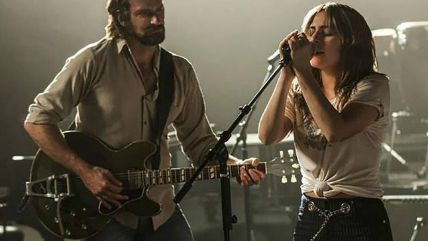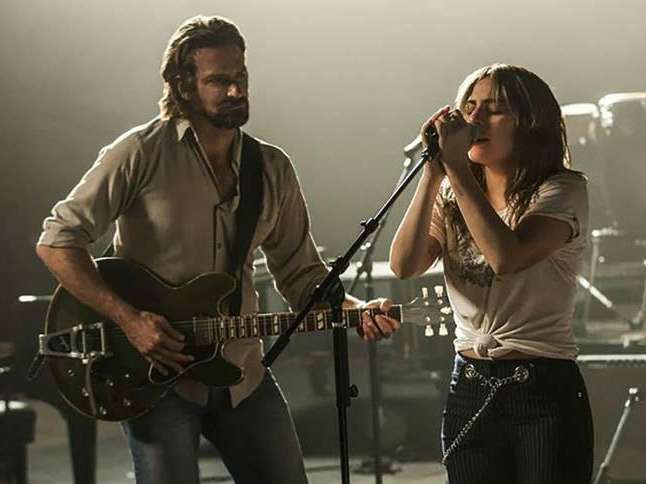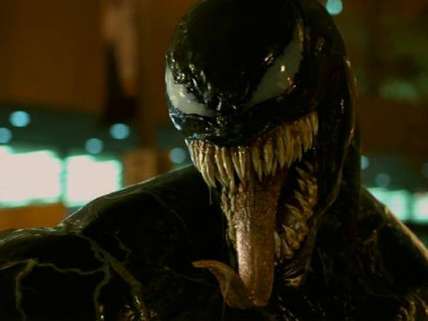Movie Reviews: A Star Is Born and Venom
Bradley Cooper and Lady Gaga on fire. Tom Hardy: space case.


The plot remains as syrupy as it was in the three previous iterations of this story (1937, with Janet Gaynor and Fredric March; 1954, the gold standard, with Judy Garland and James Mason; and 1976, the aluminum standard, with Barbra Streisand and Kris Kristofferson). But Bradley Cooper's take on A Star Is Born is a revelation on a couple of levels. The cinematography, by Matthew Libatigue, has a rich, creamy warmth; and first-time director Cooper, also the movie's star and cowriter (and co-songwriter and producer, too), pushes the camera in for long, tight closeups in most of the two-shot scenes, creating a rare feeling of intimacy. And just as striking is the quality of the audio in the many concert segments (all recorded live, not pre-taped)—it's both gut-tremblingly loud and crystalline in its musical detail.
But the lead performances are what raise the movie into must-see territory. Cooper plays downward-bound country-rock star Jackson Maine with a sweet, beardy charm. And in the role of Ally, the aspiring singer whose instant attraction to the likewise-smitten Maine motors the story, Lady Gaga proves herself a radiant, natural actor, and knocks her first lead movie performance way-far out of the park.
Can there really be all that many people who don't know this story by now? Maine is an aging star who's sinking in a sea of drugs and booze, and is losing his hearing, as well. One night, desperate for a drink, he wanders into a roadside club during drag night and affably stays to watch the show. Ally, who's pals with all the queens on hand, comes out to sing La Vie en Rose with blackened hair and her eyebrows pencil-thin in the Piaf manner. Maine is transfixed, and in the movie's first great scene, set in a backstage dressing room, he tells Ally that she really has it, and could go far if she reveals her true self in her music (she's also a songwriter). When he delicately peeled a pasted-on eyebrow off her face, the love vibe was—I can't lie—irresistible. I believe I heard someone behind me melt into a puddle of molten goo right in their seat.
You know this is a story from another age because Maine never comes on to Ally. When he offers to take her home in his limo—to the house where she lives with her father, a winning Andrew Dice Clay—that's just what he does: takes her home, gets her number, drops her off and drives away. He's back in her life very quickly, though, dispatching his private jet to fly her to Memphis, where he's playing a show. Here, with Libatique's agile camera guiding us around the stage, we see that Cooper—again, performing live—actually can sing, in a husky, low-key manner, and he can play guitar pretty well, too. And there's no mistaking the fact that his costar—after Maine coaxes Ally out for a duet—can pump a scene's energy level up to 11 without even seeming to try. In short, in the movie's terms, a star is born right here.
The story, as I say, is shameless. But even though Cooper and his editor, Jay Cassidy, briskly wrap scenes up as soon as they've served their purpose, the director is hard-pressed to cram the whole tale into two hours and 15 minutes. Thus, things get a little rushed. After receiving her introductory breaks from Maine, Ally is suddenly recording a single, then an album. Then she's glommed onto by a slick manager (Rafi Gavron) who glitzes up her look, and before you know it she's on Saturday Night Live, belting a dance hit, and then at the Grammys, accepting a statuette. (Unfortunately, the night is clouded by Maine, who's also in attendance, reeling from liquor and pills and finally collapsing on national television. The commitment with which Cooper plays down-for-the-count in this scene is wince-inducing in a really visceral way.)
Ally stands by Maine through thick and—increasingly—thin. And Gaga and Cooper have such stellar chemistry, you believe in every love-struck permutation of their relationship. They're also given exceptional support by Dave Chapelle, as one of Maine's old band members, who's left the road and found happiness in home and family, and by Sam Elliott, whose rock-of-ages presence is perfect for the part of Maine's older half-brother, who sacrificed his own music-biz chances in order to tend to his screw-up sibling.
The movie may be weepy – well, it is weepy, and unless you're a strangler of kittens or something, you may well shed a tear. But it's also filled with the beauty of talent operating at top capacity, which leavens the melodrama considerably.
Venom

No matter what you might have expected this movie to be—not all that bad…not very good…frickin' awful—chances are you'd never have guessed it would be a comedy. But it is! And despite the wretched early reviews, I recommend it as an opportunity to watch Tom Hardy going mental as one-half of a very tall, toothy black space-being, and to picture in your mind the actor at home, his phone turned off to avoid frantic calls from his CAA reps to warn about the inadvisability of signing on for this movie…and then hearing him think fuck it, and signing on anyway.
This is the picture that Sony is hoping will finally stake a claim for its own share of the great Marvel Cinematic Universe, currently being hogged by Disney. Sony has the rights to make Spider-Man (and Spidey-related) movies, and Venom is maybe the most famous Spider-Man villain, so…here ya go.
Hardy plays Eddie Brock, investigative reporter. Eddie is based in San Francisco, where among the many sleazeball tech moguls lives a "genius inventor" (aren't they all) named Carlton Drake. Drake is looking for a way to synthesize a new kind of human being capable of living in outer space. His experiments along this line have so far proved unsuccessful—and fatal to the test subjects who've taken part in the project.
Eddie hates Drake. So when his boss assigns him to do an interview with the man, Eddie agrees—but then gets in a shouting match with the guy, and suddenly finds himself out of a job -- as does his girlfriend Anne (Michelle Williams), a lawyer with a business connection to Drake's shadowy Life Foundation. This Eddie-and-Anne plot-line takes up considerable space in the early innings of the picture, and it's very sweet and all, but, well…it's not a toothy black space-being. There's plenty of TBSB elsewhere in the film, though, so no big complaint.
As we've seen at the beginning of the movie, one of Drake's exploratory spacecraft has returned to Earth with a payload of alien "entities," one of which breaks loose and – in a way that strongly recalls The Hidden—starts jumping into and then out of various bodies (from an unsuspecting EMT driver to one of those little rat dogs). Eddie is the last stop on this journey, and soon, with Venom (yes, it has a name) rooming in his body, he finds himself engaged in a loopy, ongoing dialogue with this thing. (When Eddie expresses distress about some unpleasant situation, Venom calls him a "pussy.")
Eddie begins acting pretty strange. His eyes get that weird special-effects look, and he starts freaking out at the smallest annoyance. Soon Eddie is crawling around on walls with his telescoping limbs and Drake's security thugs are flying through the air—as are many cars racing around the streets of San Francisco in about the three-thousandth cinematic tribute to the 1968 Steve McQueen movie Bullitt.(Elsewhere, in a possible semi-tribute to Oldboy, Eddie climbs into a restaurant lobster tank and bites into a hapless crustacean.)
It seems wrong that a picture featuring a brain-eating supervillain should be rated PG-13. But it works—we don't miss the dripping gore and the shredded flesh. Director Ruben Fleischer (Zombieland) pushes PG-13 as far to the wall as is probably possible. The result is a kids' movie, it's true—but it's fun for one and all, I think. Those who may believe they've moved on from this tender demo might want to schedule a re-visit.


Show Comments (27)